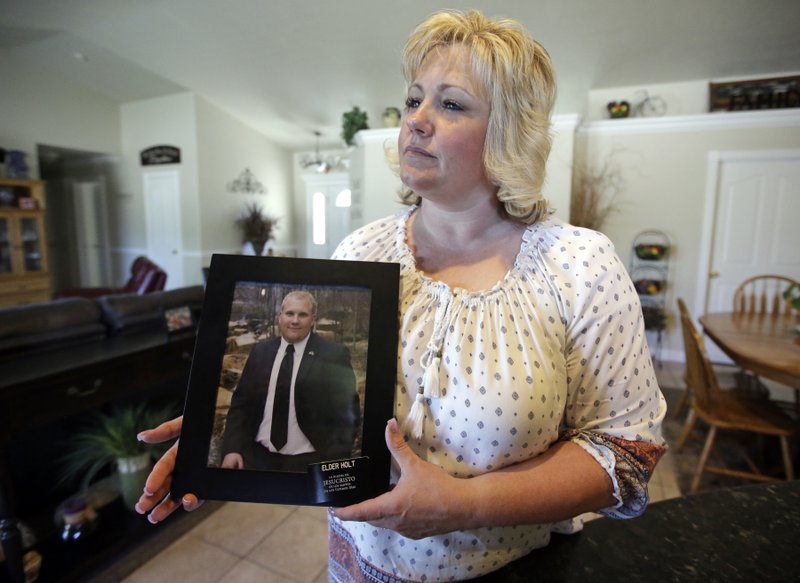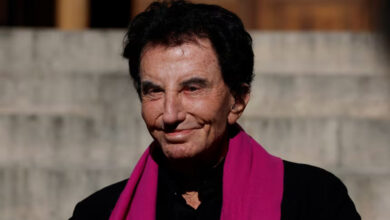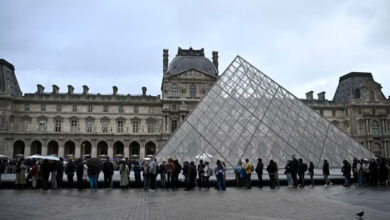
Islamic State militants agreed to give up their last pocket in Damascus on Friday, state media reported, as the government seeks to retake the entire Syrian capital and its surrounding areas for the first time since 2011.
The capitulation followed a week of escalations by pro-government forces against the IS-held Hajar al-Aswad neighborhood and Yarmouk Palestinian camp in Damascus.
Pro-government forces bombed the two areas and blanketed them with artillery fire in a crescendo of violence captured by the state-affiliated Central Military Media outlet on Friday.
The UN’s refugee agency warned that the spiraling violence was a threat to 12,000 Palestinian refugees still there — Palestinians who came to Syria since 1948, and their descendants.
Militants were given the option to stay and reconcile with the government or leave on buses to IS-held territory in the eastern Syrian desert, the SANA state news agency said. It did not say when the relocations would begin.
The Britain-based Syrian Observatory for Human Rights monitoring group reported the militants had accepted the deal.
But government airstrikes on Yarmouk resumed Friday evening, putting the fate of the agreement in question.
In 2012, Syrian rebels and army defectors pushed pro-government forces out of Yarmouk in response to a spiraling crackdown by state security services against anti-government protests.
Pro-government forces, including Palestinian factions, responded by putting the camp under siege, eventually cutting off food and water by 2014, and bombing and shelling it continuously.
Residents trickled out to neighboring areas, and the camp’s population dwindled from an estimated 200,000 people to a few thousand today, not including the IS militants, who took over the camp following a battle with rebels in 2015.
Earlier on Thursday, the Damascus-based Palestinian official Khaled Abdelmajid said the government was giving hard-liners two days to leave Yarmouk and Hajar al-Aswad, leaving the government with control of the two neighborhoods.
That initial deal appeared to have collapsed. It was not immediately clear why.
Also Friday, the US-led international coalition against the Islamic State group announced the capture of a Syrian-born German IS operative previously tied to a 9/11-linked jihadist cell.
US Col. Ryan Dillon said the coalition’s local allies in Syria captured Mohammed Haydar Zammar in northeast Syria about four weeks ago.
Zammar, a Syrian-born German, was a key member of a Hamburg jihadist cell that included three of the Sept. 11 suicide pilots. Dillon said Zammar was in custody of the Syrian Democratic Forces.
Syria’s central government has taken back control of dozens of towns and villages around the capital in recent weeks following a ferocious military campaign against rebels in the eastern Ghouta suburbs.
That campaign ended in allegations of a chemical weapons attack that activists say killed more than 40 people in Douma, the largest town in that area.
Rebels in Ghouta surrendered their towns in quick succession — then handed over a separate town, Dumayr, further afield from Damascus, this week.
The UN’s humanitarian arm, OCHA, said more than 55,000 fighters and civilians were bused out of the Damascus region to rebel-held areas in north Syria in recent weeks.
UN officials and human rights groups say the evacuations amount to forced population displacement and may be a war crime.
International experts from the Organization of the Prohibition of Chemical Weapons were waiting to visit Douma on Friday, thirteen days after the alleged chemical weapons attack on the town.
The US and Britain earlier this week accused the Syrian government and Russia of stalling to cover up evidence of their culpability.
The Syrian government and Russia denied responsibility. Instead, Syrian state TV showed doctors from Douma saying the attack was fabricated.
Activists say the doctors spoke under pressure.
Haitham Bakkar, a media activist from Douma, said he believed the doctors should have elected to relocate to north Syria instead of choosing to live under government authority.
“These are the leaders of the medical sector, and today the government is using them to change the truth,” said Bakkar from an apartment in Gaziantep in Turkey, where some media activists and first responders have reached.
Living conditions in northern Syria have become exceedingly difficult for the more than one million Syrians displaced there from other parts of the country. Most arrive to find housing is priced beyond their means and refugee camps in appalling conditions. The region is also targeted by irregular Syrian and Russian airstrikes.
The US, France, and Britain struck suspected Syrian chemical weapons facilities a week after the April 7 attack.
The Syrian government says it is fighting a war against terrorism and has sought to portray its recent gains as liberating territory from terrorist control.
Douma resident Zakariya al-Dibes, 37, told journalists on a government-arranged media tour of the formerly besieged town that the fighters once in control had hoarded food supplies, doling out single-dish rations of rice to locals once every three days.
Rebels appeared to have set up jail cells in the basements of almost every civic building in the town.
On Thursday, Syria’s foreign ministry returned President Bashar Assad’s Legion d’Honneur medal to France, saying Syria would not keep the award after France joined the US and Britain to strike Syrian military installations last Friday.
The French press reported earlier this week that the Elysee Palace was starting proceedings to revoke the award after the French government accused the Syrian government of being behind a chemical weapons attack inside Syria. French President Jacques Chirac awarded Assad the medal in 2001.




